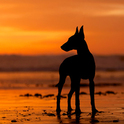Then we make this a closed gene pool and we start breeding. Every generation we choose the "best" dogs and neuter/spay the rest. Some of the genetic variation you started with is lost in the dogs removed from the gene pool. Plus, every generation a few genes are lost just by random chance because they didn't get passed on to a puppy.
| You lose a few genes every generation. What did those genes do? Whatever it was, it won't happen if the gene is gone. Every gene lost breaks something. So 50 generations on, you've lost lots of the original genetic variation. There should be a lot of things that do not function like they're supposed to. And here we are. It's not that we have a mutation that we need to "get rid of"; it's that we've lost the NORMAL gene that should be doing its job. You can't start with something complicated, throw out a bunch of random parts, and hope that it will work like it's supposed to. We started with healthy dogs; we threw out genes, and now we have unhealthy dogs. It can't be any other way. |
This is why we will NEVER fix the genetic disorder problem in dogs the way we're trying to do it. We need to put the genes back into the gene pool that have been lost so things can work like they're supposed to.
How do wild animal populations manage to stay healthy for thousands of generations (without DNA testing!!!)? They don't lose important genes from the gene pool. Animals occasionally move from herd to herd, or flock to flock, which restores genes that are lost from a population. If a population becomes isolated and new individuals are prevented from joining, the gene pool is effectively closed and the population goes extinct. Always.
Breeders of other domestic animals understand this. Dogs are not different. What is it about dogs that we can't manage to get this right?
ICB's online courses
***************************************
Visit our Facebook Groups
ICB Institute of Canine Biology
...the latest canine news and research
ICB Breeding for the Future
...the science of animal breeding


